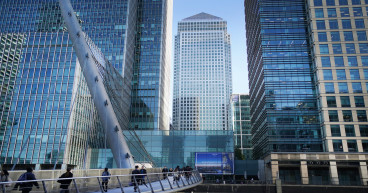0R15 9173.0 0.0% 0R1E 8151.0 0.0% 0M69 20225.0 60.6434% 0R2V 226.5 0.6667% 0QYR 1444.5 1.404% 0QYP 425.0 0.0% 0RUK None None% 0RYA 1530.0 -2.8571% 0RIH 179.7 0.0% 0RIH 175.1 -2.5598% 0R1O 212.5 9900.0% 0R1O None None% 0QFP None None% 0M2Z 250.6141 0.2757% 0VSO 33.18 -6.8108% 0R1I None None% 0QZI 587.0 0.0% 0QZ0 220.0 0.0% 0NZF None None% 0YXG 172.4228 -1.6245%
Finance
FTSE 100’s small losses over 2022 help it outperform international markets

Image Source: PAMEDIA
The UK’s FTSE 100 fell by just 0.7% in 2022 and the pound lost about 1.5 cents against the US dollar, after surviving a tumultuous year beset by war in Ukraine, post-Covid recovery and mini budget turbulence.
London’s top index outperformed other major international markets this year.
While the FTSE 100 closed the year with small losses from the start of 2022, the US’s top index, the S&P 500, lost more than a fifth of its value over the year, analysts at Swissquote Bank said.
“The fact that the FTSE 100 is heavily crowded in energy and mining stocks is what made it perform so well this year”, Ipek Ozkardeskaya, senior analyst at the lender said.
“Among the biggest market caps, oil giants BP and Shell are up by more than 40% each year-to-date.
“Plus, British big stocks make most of their revenues in terms of US dollars; a good thing for a year when sterling lost up to 23% against the US dollar at one point, and is still down around 10% right now.”
From where the FTSE 100 started 2022, on January 4, to where it ended the year, on December 30, the index lost just 53.41 points, or 0.71%.
About £111 billion was wiped off the value of the blue-chip index over the year, based on the net market cap of the FTSE 100, provided by the London Stock Exchange Group.
However, quarterly reviews of companies listed on the index and corporate actions, like global mining giant BHP leaving the FTSE 100 at the start of the year, will have affected the market cap value over the year.
Defence giant BAE Systems was the best-performing stock this year, delivering returns of 55% on the back of Russia’s war in Ukraine which drove up military spending across the continent.
Other experts echoed the sentiment that the FTSE 100 has finished the year in a stronger position than its rivals, benefitting from cheaper valuations and an attractive mix of stocks.
Ed Monk, associate director for personal investing at Fidelity International, said: “UK stocks dodged the deep falls that other markets suffered in 2022, notably the US, thanks mainly to its bias towards commodities, and currency effects.
“A weaker pound made the high proportion of overseas earnings by British companies worth more in sterling terms.
“That doesn’t alter the fact, however, that the backdrop for share prices remains weak, with recession taking hold and consumers likely to feel a squeeze on their finances for some months to come.”
The FTSE 100 saw both the steepest daily fall and biggest daily rise over the two days after Russia first invaded Ukraine.
It plummeted by 290.8 points on February 24, or 3.88%, the same day that Putin’s forces moved into Ukraine, wiping off almost £77 billion over the course of the day.
But the losses were swiftly reversed the following day, when it lifted 282.02 points, or 3.91%.
Meanwhile, the pound made an impressive recovery after plunging to all-time lows against the US dollar shortly after former Chancellor Kwasi Kwarteng’s mini budget.
It tumbled to around 1.086 US dollars on September 19, but finished the year trading at 1.2025 US dollars.
It means that about 1.5 cents have been shaved off the value of the cable – which refers to the exchange rate of the pound against the UK dollar – since the start of the year, when it was trading at 1.3483 dollars.
Ian Stokes, managing director of corporate markets UK & Europe at Link Group, said: “The pound has perked up a bit in the last few weeks reflecting more aggressive rate rises by the Bank of England and greater market confidence in the current Government.”
The financial data firm said that this year’s surge in the US dollar will add about £5.2 billion to UK dividends, meaning payouts to FTSE shareholders, because such a large proportion of FTSE dividends are declared in dollars rather than pounds.
However, this is about £460 million less than it could have been if the pound had held at the lows it dropped to in mid-October, Link Group said.